where c = 10 km/hr
There are many pictures so it may take a few minutes to download this page.
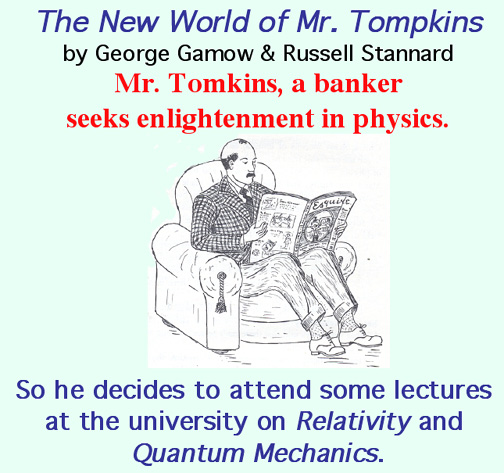
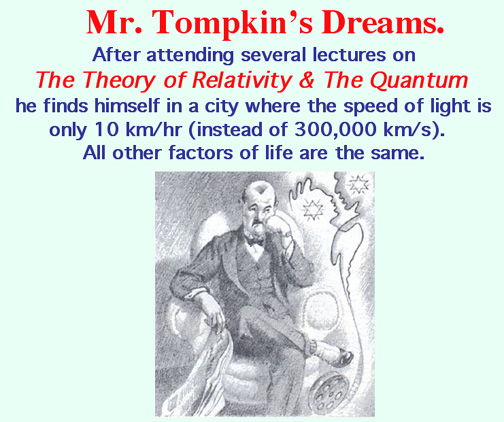
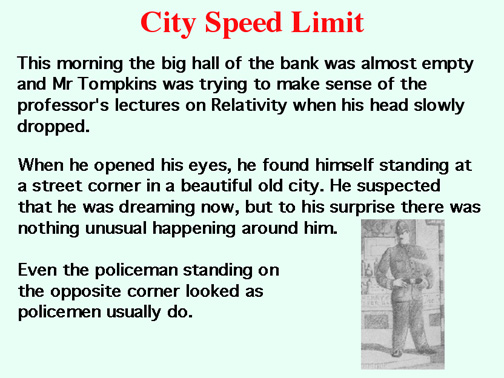
where c = 10 km/hr
There are many pictures so it may take a few minutes to download this page.



The hands of the big clock on the tower down the street were pointing almost to noon and the streets were nearly empty.
A single cyclist was coming slowly down the street and, as he approached, Mr Tompkins' eyes opened wide with astonishment. For the bicycle and the young man on it were unbelievable flattened in the direction of the motion…
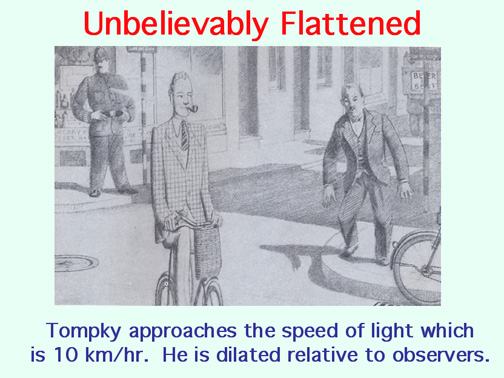
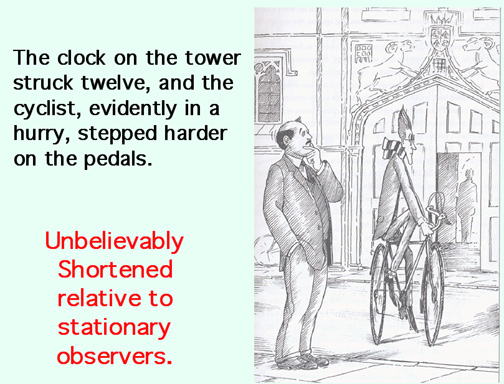
Mr Tompkins did not notice that he gained much in speed, but, as the result of his effort, he flattened still more and went down the street looking exactly like a picture cut out of cardboard.
Then, Mr Tompkins felt very proud because he could understand what was happening to the cyclist-- it was simply the contraction of moving bodies about which he had just learned.
"Evidently nature's speed limit is lower here," he concluded, "that is why the bobby on the corner looks so lazy, he need not watch for speeders."
In fact a taxi moving along the street at the moment and making all the noise in the world was just crawling along could not do much better than the cyclist.

[It has much more power than a bicycle, so the dilation is greater to observers.]
Mr Tompkins decided to overtake the cyclist, who looked a good sort of fellow, and ask him all about it.
Making sure that the policeman was looking the other way, he borrowed somebody's bicycle standing near the kerb and sped down the street.

He expected that he would be immediately flattened, and was very happy about it as his increasing figure had lately caused him some anxiety. A beefy toshtada.
To his great surprise, however, nothing happened to him or to his cycle. On the other hand, the picture around him completely changed.
The streets grew shorter, the windows of the shops began to look like narrow slits, and the policeman on the corner became the thinnest man he had ever seen…
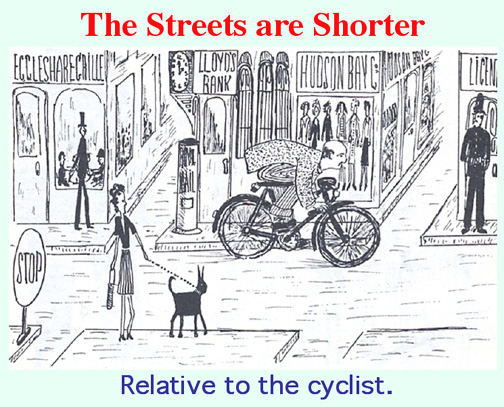
And the buildings are thinner and closer together.
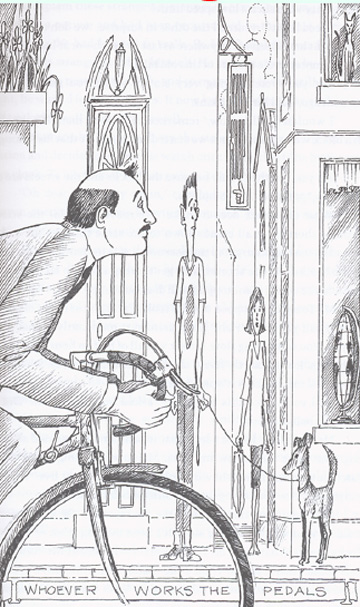
"By Jove! " exclaimed Mr Tompkins excitedly, "I see the trick now. This is where the word relativity comes in. Everything that moves? relative to me gets shorter for me, or whoever works the pedals ! "
He was a good cyclist and was doing his best to overtake the young man, but he found that it was not at all easy to get up speed.
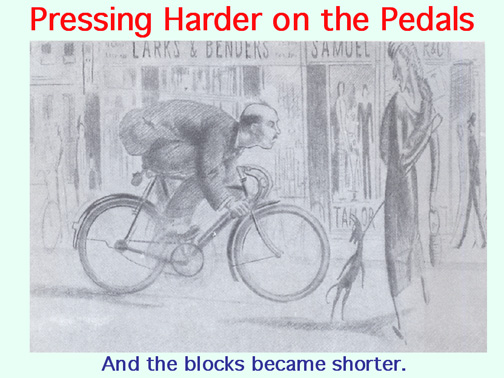
Although he was working on the pedals as hard as he possibly could, the increase in speed was almost negligible.
His legs already began to ache, but still he could not manage to pass a lamp-post on the corner much faster than when he had just started.
It looked as if all his efforts to move faster were leading to no result.
He understood now very well why the cyclist and the cab he had just met could not do any better.
And he remembered the words of the professor about the impossibility of surpassing the limiting velocity of light.
He noticed, however, that the city blocks became?still shorter and the cyclist riding ahead of him did?not now look so far away.
He overtook the cyclist at the second turning and, when they had been riding side by side for a moment, was surprised to see that he was quite a normal, sporting-looking young man.
"Oh, that must be because we do not move relative to each other”, he concluded, and he addressed the young man…
“Excuse me, sir,” he said, "Don't you find it inconvenient to live in a city with such a slow speed limit?”
“Speed limit?” returned the other in surprise,“we don't have any speed limit here. I can get anywhere as fast as I wish, or at least I could if I had a motorcycle instead of this nothing-to-be-done-with old bike ! ”
“But you were moving very slowly when you passed me a moment ago ”, said Mr Tompkins. “I noticed you particularly.”
“Oh you did, did you?” said the young man, evidently offended.
“I suppose you haven't noticed that since you first addressed me we have passed five blocks. Isn't that fast enough for you!”
“But the streets became so short,” argued Mr Tompkins.
“What difference does it make anyway, whether we move faster or whether the street becomes shorter. I have to go ten blocks to get to the post office, and if I step harder on the pedals the blocks become shorter and I get there quicker. In fact, here we are”, said the young man getting off his bike.
Mr Tompkins looked at the post office clock, which showed half-past twelve.
“Well ! ” ?He remarked triumphantly, “it took you half an hour to go this ten blocks. When I saw you first it was exactly noon! ”
“And did you notice this half hour? ” asked his companion.
Mr Tompkins had to agree that it had really seemed to him only a few minutes.
Moreover, looking at his wrist watch he saw that it was showing only five minutes past twelve.
“Oh,” he said, “is the post office clock fast? ”
“Of course it is, or your watch is too slow, just? because you have been going too fast. ?What's the matter with you, anyway? ?Did you fall down from the moon ” and the young?man went into the post office.
After this conversation, Mr Tompkins realized how unfortunate it was that the professor was not at hand to explain all these strange events to him. The young man was evidently a native, and had been accustomed to this state of things even before he had learned to walk.
So Mr Tompkins was forced to explore this strange world by himself. He put his watch right by the post office clock and, to make sure that it went all right, he waited for ten minutes.
His watch did not lose. Continuing his journey down the street he saw the railway station and?decided to check his watch again. To his surprise it was again quite a bit slow.
“Well, this must be some relativity effect, too,”concluded Mr Tompkins, and decided to ask about it from somebody more intelligent than the young cyclist.
The opportunity came very soon. A gentleman obviously in his forties got out of the train and began to move towards the exit.
He was met by a very old lady, who, to Mr Tompkins's great surprise, addressed the young man as “Dear Grandfather”…
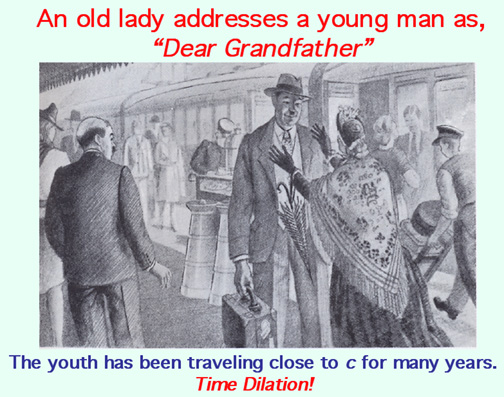
This was too much for Mr Tompkins. Under the excuse of helping with the luggage, he started a conversation.
“Excuse me, are you really the grandfather of this nice old lady? You see, I am a stranger here, and I never…”
“Oh, I see”, said the gentleman, smiling with his moustache. “I travel quite a lot, and, as I spend most of my life in the train, I naturally grow old much more slowly than my relatives living in the city.
I am so glad that I came back in time to see my dear little granddaughter still alive ! But excuse me, please, I have to attend to her in the taxi ”.
Having a cup of coffee, Mr Tompkins even went so far as to claim that he had found a contradiction in the famous principle of relativity.
“Yes, of course,” thought he, “if all were relative,?the traveller would appear to his relatives as a ?very old man, and they would appear very old to ?him, although both sides might in fact be fairly ?young.
But what I am saying now is definitely nonsense: ?One could not have relative whiskers!
So he decided to make a last attempt to find out how things really are, and turned to a solitary man in railway uniform sitting in the buffet.
“Will you be so kind, sir, ” he began, “will you be good enough to tell me who is responsible for the fact that the passengers in the train grow old so much more slowly than the people staying at one place? ”
“I am responsible for it ”, said the man, very simply.
“Oh! ”exclaimed Mr Tompkins, “So you have solved the problem of the Philosopher's Stone of the ancient alchemists. You should be quite a famous man in the medical world. Do you occupy the chair of medicine here? ”
“No,” answered the man, being quite taken aback by this, "I am just a brakeman on this railway. ”
“Brakeman! You mean a brake man . . .” exclaimed Mr Tompkins, losing ground beneath him “You mean you just apply the brakes when the train comes to the station? ”
“Yup, that's all I do, and every time the train gets slowed down, the passengers gain in their ages relative to other people… Of course, the engine driver who accelerates the train does his part too.”

“But what's that have to do with staying young?? ”
“I asked a university professor about it once, but only got a bunch of incomprehensible talk including something about Redshifts, I think. Sheesh ”, and he walked off.
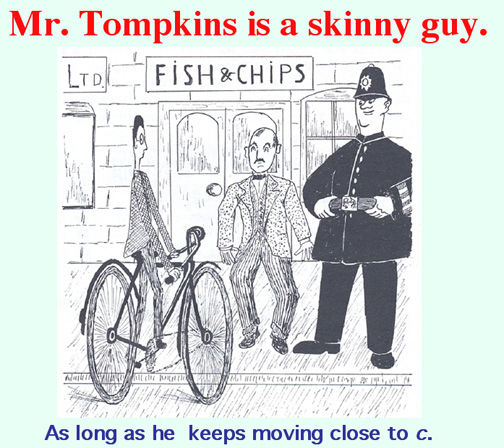
A big, sombre-looking waiter came to his table with a bill, and Mr Tompkins began to search in his pockets for change..
Not finding any, he asked the gloomy waiter whether a cheque would do.
“No,” barked the waiter, “give me cash. Cash it please! ”
And Tompky raised his head from the table.
Across the table stood the professor, pushing a cheque towards him in the bank.
“Oh,” exclaimed Mr Tompkins, “Am I glad to see you. I just wanted to ask if one can get eternal life simply by running round all the time? ”
“Sorry, I don't get you", said the professor. Will you please cash this cheque, I am in a hurry for a meeting and I hate meetings! ”
Mr Tompkins sighed, and started to count out the banknotes.
“I’ll take a course in physics!”
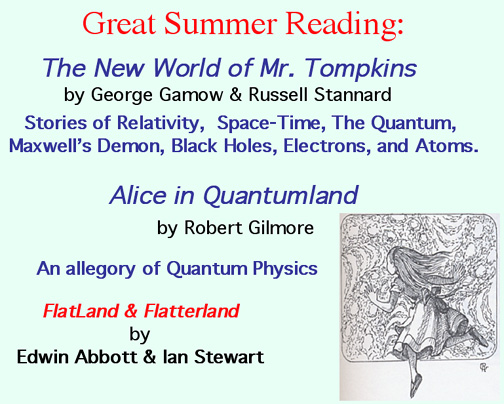
Here Endeth Mr. Tompkins